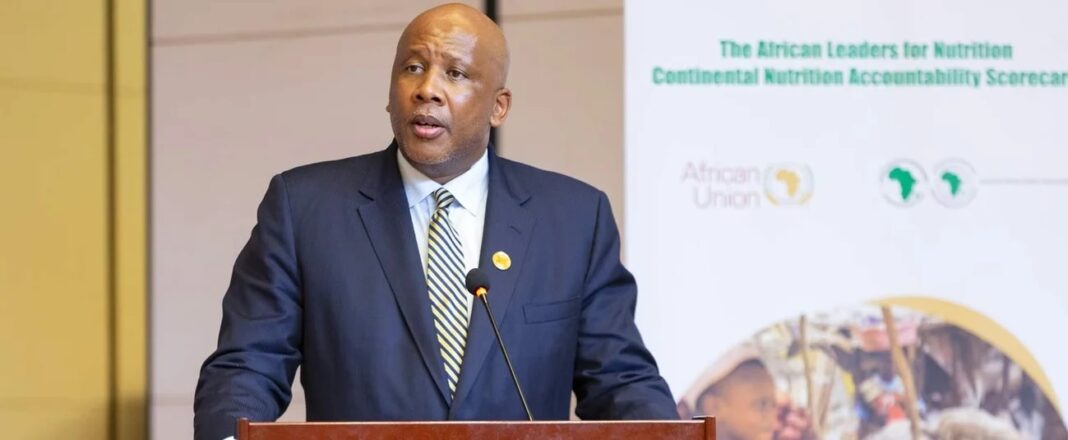Ntsoaki Motaung
During a pivotal high-level side event on integrating nutrition financing within the climate change framework at COP28, His Majesty King Letsie III introduced an imperative position paper on integrating nutrition into climate financing.
The position paper is titled “From Commitment to Action – Integrating Nutrition Financing in the Climate Change Framework.”
The event, hosted by African Leaders for Nutrition and esteemed partners, highlighted the urgency of intertwining nutrition and climate finance strategies.
Representing the king during the opening ceremony, Professor Nqosa Mahao, Minister of Energy, underscored the paper’s pivotal role.
It calls upon African leaders to prioritise strategic climate finance utilisation, fostering not only robust and healthy food systems but also sustainability and equity.
Mahao emphasised the profound impact of climate change on essential food sources, highlighting the imperative need for sustainable, climate-resilient, and healthy diets.
He noted that these transitions not only mitigate health and climate change costs but also bolster food security amid climate-induced challenges.
Highlighting the critical nexus between climate change and nutrition, the paper advocates for integrating nutrition considerations into the climate financing framework.
This collaborative effort involves African Leaders for Nutrition alongside key partners such as the African Union (AU) Commission, Scaling Up Nutrition-SUN Movement, Harvest Plus, Power of Nutrition, Nutrition International, Global Panel, UNICEF, Food and Agriculture Organisation of the United Nations (UN), and UN Nutrition.
Mahao warned: “The risk of hunger and malnutrition could surge by 20 percent by 2050 if the global community fails to effectively mitigate and prevent the adverse effects of climate change.”
He stressed the paramount need for comprehensive strategies that seamlessly integrate climate change adaptation, disaster risk reduction, and nutrition interventions, ensuring the resilience and well-being of communities facing climate-related malnutrition challenges in Africa.
The meeting, held on December 9, was convened by the government of Somalia, the AU Nutrition Champion, the AU Commission, the African Development Bank’s African Leaders for Nutrition, and collaborative partners.
Highlighting the critical intersection between nutrition and climate change, Ambassador Minata Samate Cessouma, AU Commissioner for Health, Humanitarian Affairs, and Social Development, stressed the necessity for a global response that integrates nutrition financing into broader climate change strategies.
Cessouma stated: “Climate change is not solely an environmental concern; it significantly determines food security, nutrition, and overall well-being.”
Climate change profoundly impacts malnutrition, affecting food systems, availability, access, and nutritional quality.
The intricate relationship between climate change and malnutrition underscores the urgent need for comprehensive, integrated approaches to address both challenges simultaneously.
Cessouma emphasised: “Today, we convene to discuss a matter of paramount importance: the integration of nutrition financing into Africa’s Climate Change Framework. Climate change poses an unprecedented threat to our people’s health and well-being, while adequate nutrition is fundamental for building resilience and ensuring community prosperity.”
Dr. Garba Laouali, Manager of the African Development Bank Agricultural Production, Sustainability, and Research division, highlighted the urgency of a comprehensive, integrated approach to address the complex relationship between climate change and malnutrition, acknowledging its impact on food availability, access, and nutritional quality.
Afshan Khan, SUN Movement Coordinator, provided an overview of the position paper, stating: “The integration of nutrition financing into climate financing marks a pivotal step towards addressing intertwined challenges, outlining a comprehensive approach essential for Africa’s sustainable development.”
Incorporating nutrition concerns into the climate finance framework is crucial given the escalating impacts and risks of climate change.
Shockingly, over 2 billion individuals face micronutrient deficiency, with 828 million undernourished and 676 million suffering from obesity.
Child and maternal malnutrition rank among the top ten contributors to death and disease in both women and men, with six of the top ten causes being diet-related.
Supporting the evidence, Ahmed Madobe Nunow, Somalia’s Minister of Agriculture, provided a stark portrayal of malnutrition in Somalia, where nearly 5 million people struggle with this issue.
Summing up the outcomes of this significant event, encapsulating the essence of the position paper launch, African Leaders for Nutrition Coordinator, George Ouma, called for collective actions to ensure the inclusion of nutrition financing in climate change frameworks by the end of COP28.
Summary
- During a pivotal high-level side event on integrating nutrition financing within the climate change framework at COP28, His Majesty King Letsie III introduced an imperative position paper on integrating nutrition into climate financing.
- Highlighting the critical intersection between nutrition and climate change, Ambassador Minata Samate Cessouma, AU Commissioner for Health, Humanitarian Affairs, and Social Development, stressed the necessity for a global response that integrates nutrition financing into broader climate change strategies.
- Garba Laouali, Manager of the African Development Bank Agricultural Production, Sustainability, and Research division, highlighted the urgency of a comprehensive, integrated approach to address the complex relationship between climate change and malnutrition, acknowledging its impact on food availability, access, and nutritional quality.

Your Trusted Source for News and Insights in Lesotho!
At Newsday Media, we are passionate about delivering accurate, timely, and engaging news and multimedia content to our diverse audience. Founded with the vision of revolutionizing the media landscape in Lesotho, we have grown into a leading hybrid media company that blends traditional journalism with innovative digital platforms.









